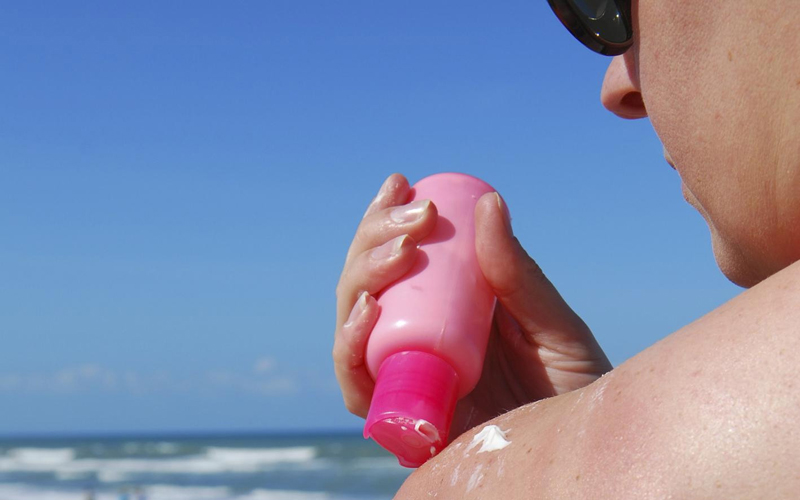Why we should all really be wearing sunblock every day
Chances are, you put sunblock on reluctantly, and only so you don’t turn an unattractive shade of pink when you’re on holiday.
Now the sun is starting to show its face, you might be heading out to the shops for your annual sunscreen purchase. But we’re here to tell you that you’re actually doing this all wrong.
In fact, the beginning of summer isn’t when you should be starting to think about sunscreen, because you should be wearing it every day, all year round – and here’s why…
What UV rays actually do to your skin…
UV rays almost feel like the boogeyman – you know you should be scared of them, but many of us aren’t quite sure why. However, they are something you really should be wary of because they have the power to alter the genes in the DNA of your skin cells.
Dr Nicole Chiang, consultant dermatologist at BMI The Highfield Hospital and BMI The Beaumont Hospital in Lancashire, says: “Not all DNA changes are detrimental, and as we age we tend to find that our skin ages in proportion, but UV rays from sunlight have been identified as the main cause of altered DNA leading to skin cancer. It is also linked to premature ageing.”
Abi Cleeve, Ultrasun UK MD, agrees: “The single biggest factor in the ageing of skin is exposure to UVA and UVB rays. They penetrate and attack the skin, causing damage to collagen and elastin, which are the very building blocks of our skin’s structure.”
Sure, you probably were half aware of this already. But the main thing you might not know is that you should be wary of these rays regardless of the season. Cleeve says: “Potency may be higher in warmer months, but UVA is a year round issue.” In fact, over 90% of UV rays can penetrate light cloud cover – meaning that your skin is subjected to constant exposure, regardless of the season.
Know the difference between wearing sunscreen and SPF…
Many of us feel smug because we wear a moisturiser that has SPF built in. But we hate to break it to you – this isn’t quite good enough. In fact, SPF only protects you from UVB rays, and not UVA.
Both types of UV rays can damage your skin, but UVA rays are much more of a worry. This is because UVA rays make up for 95% of the total UV rays that reach earth. Cleeve says: “UVA causes damage to the deepest skin layers, even reaching the subcutaneous level.”
It’s also worth noting that not all sunblocks are created equal. Chiang warns: “Sunscreens tend to contain either chemical or physical UV filters. If you are prone to allergies, try to go for sunscreens containing physical UV filters; the ingredients to look out for are titanium dioxide and zinc oxide.”
Many of us hate wearing sunscreen because it’s thick, claggy and just a bit too greasy, but luckily the skincare industry has been coming on in leaps and bounds. Products like La Roche-Posay Anthelios Ultra-Light Sun Cream Fluid SPF50 (£16.50, Boots) are perfect for sensitive skin and can be used just like a moisturiser every morning.
The misconceptions around black skin…
The skincare industry may have an historical bias towards catering for white skin only, but this is thankfully changing, and misconceptions around black skin are beginning to be addressed.
“It’s a myth that black skin doesn’t need sunscreen,” says Dija Ayodele, aesthetician and founder of the Black Skin Directory. “Black skin may be ahead of the game with a natural SPF of about 13, but that is not enough protection.”
This means people of colour also need to consider wearing sunscreen every day – Ayodele recommends of SPF30 or above. Black skin can still burn when exposed to too much sun, which can also have an effect on the melanin-producing cells and cause patchy skin.
Ayodele says: “Studies show that while black people are less likely to develop melanoma and non-melanoma skin cancer than caucasians, they are more likely to die from it, because it is usually detected at the later stages when it is more challenging to treat. This is partly down to the misconception that the sun doesn’t harm black skin, hence we are less vigilant about our application of sunscreen.”
The bottom line…
UVA damage is cumulative and non-reversible. Not only do you risk skin cancer (which is the fifth most common form of cancer in the UK), but from a purely superficial point of view, your skin will age more quickly and is likely to show up with more pigmentation marks.
Not to sound too much like your mum, but it’s worth putting on sunscreen every day to combat this. When you find the right product, it’ll feel just like a primer to go underneath your make-up and you won’t even notice that you’re putting on sunblock – but your skin definitely will.
The Press Association
Latest posts by The Press Association (see all)
- Maple Cinnamon Granola - January 8, 2025
- 8 things your feet can tell you about your health - January 8, 2025
- 9 ways to look after your emotional health better in 2025 - January 7, 2025
- EastEnders fans to vote on storyline for the first time in 40th anniversary week - January 7, 2025
- Aldi beats rival Lidl as cheapest supermarket of 2024 - January 6, 2025





















